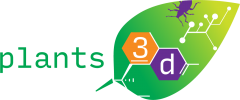Plants provide food, fiber, and biomolecules (phytochemicals) used in medicine and a myriad of industries. Meeting the food and health needs of the projected growth in the world population will require a significant increase in crop productivity. This can optimally be accomplished in crops by reducing pest and microbial pathogen susceptibility and enhancing endurance to stressors such as drought, salinity, flooding, temperature extremes, and nutrient deficiency.
The Plants3D research-training program trains graduate students in plant sciences and engineering to:
- Discover pathways that plants use to sense and respond to abiotic and biotic signals; metabolic pathways that produce valuable natural products.
- Design novel signaling components that regulate stress tolerance; synthetic biology tools to efficiently transform and express optimized plant metabolic pathways.
- Deploy engineered stress tolerance pathways in crops; biosynthetic pathways that produce valuable metabolites in microbial hosts.
Program Overview
Students in a UCR graduate program for a PhD or MS degree may participate. The primary graduate programs of participants are:
- Chemical and Environmental Engineering (CEE)
- Plant Biology (PLBL)
- Genetics, Genomics and Bioinformatics (GGB)
- Plant Pathology
- Bioengineering (BIG)
Education and Training Program Path. Key training components for a typical trainee.
The urgent need to improve the environmental resilience of plants and the rapid growth of the phytochemical industry has placed high demands on workforce availability and training. Plants3D will provide trainees with a broad range of expertise, extending beyond research skills, to enable them to enter a range of industries.
Plants3D coursework and activities include:
- Product Design & Entrepreneur Course, including translation to the biotech/industrial scale to satisfy a grad program “Specialization” requirement (Ph.D./MS, Yr 1, Spring, for all). BPSC/CEE208 T/TH Every Spring Quarter – Spring 2023 Syllabus
- Annual Retreat and Design Competition catalyzing feasible cutting-edge interactive projects (Fall of each year). Click here for more on some of our prior Retreats: 2019, 2020, 2021, 2022
- Data Science training (i.e., bioinformatics, modeling) through coursework requirements/options of the graduate program, IIGB workshops, and participation of data science research faculty (throughout).
- Science Communication training and practice integrated into the Product Design & Entrepreneur Course and workshops for communication to specialized and lay audiences (throughout).
- Fall Design Tournament. Ideas of individuals that evolve into team projects. These are peer-evaluated through the the “final” four present at the Retreat. Trainees are required to participate in two Tournaments or until engaged in an active team project.
- Funded 2+ trainee teams are guided by mentors from biology and engineering with Advisory Board input. Active participation.
- Industrial internship selected with PI and program guidance (PhD, Year 3 or 4; MS as feasible).
Product Design & Entrepreneur Course
BPSC/CBPSC/CEE208 T/TH Every Spring Quarter
BPSC/CEE 208 is led by two faculty (one biologist / one engineer) with participation of an Entrepreneur-in-Residence (lecturer) with industry experience from UCR’s Entrepreneurial Proof-of- Concept and Innovation Center (EPIC). The course will guide students through the discovery, design and deployment of plant and industrial biotechnologies that address grand challenges through integration of plant/microbe biology, synthetic biology, sensor technology and bioprocessing. This interactive course will use convergence practices to tackle a scientific challenge that meets the needs of an end user/society. Students will co-create a shared knowledge bank and solution strategy that is built from tools and approaches from multiple disciplines. Interaction activities will be formal and informal.
In the Discovery Phase, students will actively explore plant-based solutions through critical analysis of case studies: (1) Synthetic Biology: engineering of plant secondary metabolite pathways for the production of commodity chemicals and pharmaceuticals in microbes (i.e., 1,4-butanediol, opioids); (2) Crop Improvement: enhancing abiotic and biotic stress resilience (i.e., manipulation of ABA signaling through receptor design of cell-specific metabolism to fine-tune energy sensing and sink strength to enhance drought resilience or effective gene regulation for pathogen resistance).
In the Product Design Phase, teams of 3-4 engineering/biology Fellows/Associates/others will be provided a nascent project/product concept developed by two Participant faculty and pre-vetted by the Plants3D Advisory Board, whose experience in commercialization will be critical for assessment in promoting iterative improvement. Cohort-based team projects should maximize the development of successful long-term collaborative and convergent research endeavors supervised by two or more faculty. Students will learn the basics of process selection, product manufacturing approaches, techno- economic analysis, intellectual property practices and business model development. This period will include guest lectures and activities in Marketing, Intellectual Property, Entrepreneurship and Ethics. Trainees will consider the needs of the end users (industry/farmer) and product market fit through direct communication with potential stakeholders.
For evaluation of processing alternatives, mass and energy balances and costing, students will be taught the use of SuperPro Designer™️, aiding prototype development to market deployment. Instruction by an Entrepreneur-in-Residence or industrial advisors will provide exposure to “the business of science”.
In the final Presentation Phase, teams will receive a constructive critique by an Entrepreneur-in-Residence and advisors, with a final presentation to a broader audience. This course will sustain a path for convergence training and entrepreneurship to be cultivated by our EPIC and NSF I-Corps programs. Integral to the course will be communication training, including rubric-based feedback to individuals.
Course Syllabus for Spring 2023
Industrial Internships
A core training element will be a practical internship e.g. in ag/microbial biotech, synthetic biology, government agency or patent law firm. These will be for 2-3 months, providing work experience outside academia, in some cases relevant to student projects. It will involve an application ascertaining research, skill-sets and career goals. Internships will take place after the Qualifying/Proficiency Exam and will be required for all Fellows and local placement will be possible. The internship will commence with a short proposal that outlines experiential objectives and end with summary (company restrictions may apply). Fellows will have a designated industrial mentor during their internship. (PhDs, summer of Year 2 or 3; internships for Associates as a broader impact). Please contact Ian Wheeldon or Julia Bailey-Serres to discuss your internship possibilities. See Handbook.
